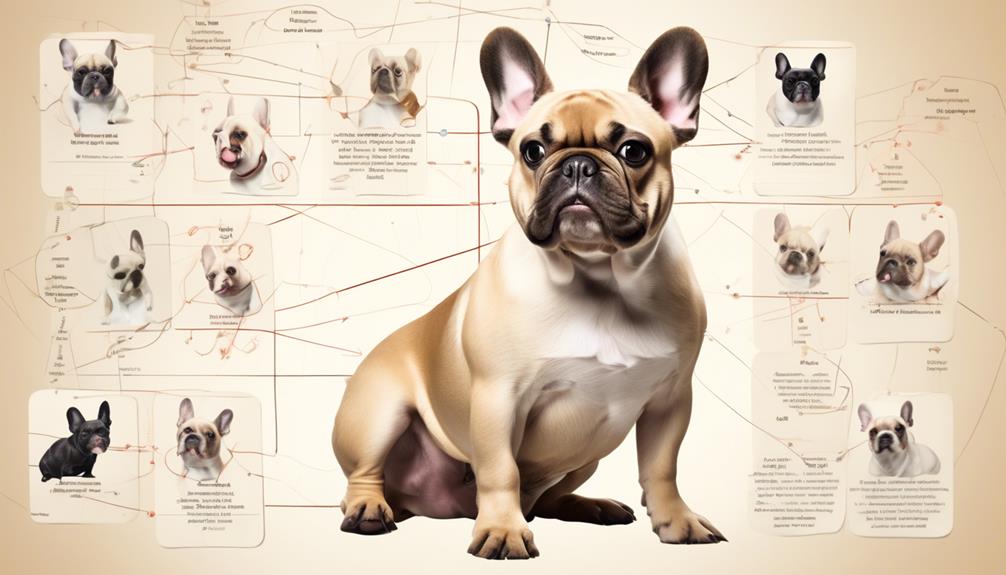Key Influences on French Bulldog Temperament
When it comes to understanding the temperament of French Bulldogs, it's essential to consider the various factors that contribute to their unique personalities. From genetic predispositions to environmental influences, there are multiple elements at play.
However, the intricate interplay between these factors often leaves many owners wondering how best to navigate the complexities of nurturing a well-rounded French Bulldog companion. Understanding these key influences can provide valuable insight into helping your French Bulldog thrive, making it essential to explore each factor in depth.
Genetic Factors

Understanding the genetic factors that influence the temperament of French Bulldogs is essential for breeders and owners alike. Behavior genetics plays a crucial role in determining the inherited traits of French Bulldogs. These traits not only define their physical characteristics but also significantly impact their temperament. As a French Bulldog owner, being aware of these genetic factors can help you better understand and manage your furry companion's behavior.
French Bulldogs inherit certain traits from their parents, which can greatly influence their temperament. For example, if both parents have a calm and friendly temperament, it's likely that the puppies will also exhibit similar behavior. On the other hand, if one or both parents display aggression or shyness, these traits may also be passed down to their offspring. Recognizing these inherited traits can provide valuable insights into the potential behavior of French Bulldogs and help owners anticipate and address any challenges that may arise.
As a responsible breeder, it's crucial to consider the behavior genetics of the parent dogs when planning a litter. By selecting breeding pairs with desirable temperamental traits, breeders can contribute to the overall improvement of the French Bulldog breed. Additionally, educating potential owners about the genetic factors influencing temperament can help them make informed decisions when choosing a puppy that aligns with their lifestyle and preferences.
Early Socialization
When raising a French Bulldog, early socialization plays a crucial role in shaping their temperament and behavior. Proper socialization is essential for your Frenchie's behavioral development and overall well-being.
Here are some key points to consider when focusing on early socialization:
- Positive Exposure: Introduce your French Bulldog to various environments, people, and animals in a positive and controlled manner. This exposure helps them become well-adjusted and confident in different situations.
- Handling and Touching: Get your Frenchie accustomed to being handled, including grooming, nail trimming, and gentle touching. This helps prevent fear or aggression related to handling as they grow older.
- Training and Obedience: Start early with basic training and obedience commands. This not only establishes boundaries and expectations but also strengthens the bond between you and your French Bulldog.
- Socialization Techniques: Utilize techniques such as puppy classes, supervised playdates with other dogs, and controlled interactions with unfamiliar people. These experiences are vital for developing your Frenchie's social skills and preventing fear-based aggression.
Training Techniques
To effectively train your French Bulldog, consistent and positive reinforcement is essential for shaping their behavior and fostering a strong bond with you. Positive reinforcement, such as treats, praise, and play, is a powerful tool for teaching your French Bulldog desired behaviors. When your dog exhibits the behavior you want, immediately reward them to reinforce that behavior. This creates an association between the action and a positive outcome, increasing the likelihood of the behavior being repeated.
Additionally, using behavior modification techniques can help address any unwanted behaviors in a positive and constructive manner. For instance, if your French Bulldog displays a behavior you wish to modify, such as jumping on guests, redirect their attention to a more appropriate activity, like sitting, and then reward them for this new behavior. Consistency is key in training; everyone in the household should use the same commands and reinforcement methods to avoid confusion for your dog.
Furthermore, incorporating training into daily routines, such as during feeding or walks, can help reinforce positive behaviors. Training sessions should be kept short and enjoyable to maintain your French Bulldog's interest and focus. Remember to be patient and understanding, as each dog learns at their own pace.
Environmental Influence
Incorporate your French Bulldog's environment into their training routine to ensure a well-rounded and adaptable temperament. The environment plays a crucial role in the behavioral development and socialization process of your French Bulldog. Consider the following factors to create a positive and enriching environment for your pet:
- Social Exposure: Introduce your French Bulldog to various people, animals, and environments early on. This exposure helps them become more confident and well-adjusted in different situations.
- Positive Reinforcement: Create a supportive and encouraging atmosphere for your French Bulldog. Use positive reinforcement techniques such as treats, toys, and praise to foster a sense of security and trust.
- Consistent Routine: Establish a consistent daily routine for your French Bulldog. Predictability and structure in their environment can reduce anxiety and promote a stable temperament.
- Enrichment Activities: Provide mental and physical stimulation through interactive toys, games, and outdoor activities. An enriched environment can prevent boredom and destructive behavior, contributing to a well-balanced temperament.
Health and Well-being
Ensuring the health and well-being of your French Bulldog is essential for maintaining a balanced and happy temperament.
Regular exercise is crucial for your French Bulldog's physical health and mental well-being. Despite their small size, French Bulldogs are active and playful, and they benefit from daily walks and interactive play sessions. Meeting their exercise requirements not only keeps them physically fit but also helps to prevent behavioral issues that may arise from pent-up energy.
Mental stimulation is equally important for your French Bulldog's well-being. Engaging activities such as puzzle toys, obedience training, and interactive games can help keep their minds sharp and prevent boredom, which can lead to destructive behaviors.
In addition to exercise and mental stimulation, maintaining your French Bulldog's overall health through regular check-ups, a balanced diet, and proper grooming is essential. Due to their brachycephalic (short-nosed) structure, French Bulldogs can be sensitive to heat and may have breathing difficulties, so it's important to be mindful of their environment during exercise and play. Additionally, keeping an eye on their weight and providing a diet tailored to their needs can help prevent obesity and related health issues. Regular grooming, especially of the facial wrinkles, is important for preventing skin infections.
Breed Standards
Maintaining the health and well-being of your French Bulldog also involves understanding and adhering to breed standards. These standards are set by kennel clubs and breed organizations to ensure that the breed maintains its unique characteristics and physical attributes. Adhering to these standards not only preserves the breed's integrity but also promotes healthy breeding practices and overall well-being for French Bulldogs.
Importance of Breed Standards
- Preservation of Breed Characteristics: Breed standards outline the ideal characteristics and traits of French Bulldogs, including their size, coat color, and temperament.
- Health and Functionality: Breed standards also emphasize the importance of breed conformation, ensuring that French Bulldogs are structurally sound and able to perform their original functions.
- Ethical Breeding Practices: Adhering to breed standards encourages ethical breeding practices, promoting the health and well-being of future generations of French Bulldogs.
- Recognition and Quality Assurance: Following breed standards allows for the recognition of high-quality French Bulldogs and assists in maintaining the breed's reputation.
Human Interaction

How does your French Bulldog interact with humans and what're the key factors that influence this interaction?
Canine communication plays a vital role in how French Bulldogs interact with humans. These dogs are known for their expressive faces and body language, which they use to communicate their emotions and needs. Understanding your Frenchie's unique communication cues, such as ear position, tail wagging, and facial expressions, is crucial for strengthening your bond and ensuring positive interactions.
Social bonding is another key factor that influences your French Bulldog's interaction with humans. These dogs thrive on companionship and are known for forming strong attachments to their owners. Positive social experiences, such as regular playtime, training sessions, and affectionate interactions, are essential for fostering a strong bond with your Frenchie. Furthermore, early socialization with a variety of people can help ensure that your French Bulldog grows up to be well-adjusted and comfortable around different individuals.
When interacting with your French Bulldog, pay attention to their body language and vocalizations to gauge their comfort level and emotional state. Respect their boundaries and always strive to create a safe and nurturing environment for them to thrive. By understanding canine communication and prioritizing social bonding, you can cultivate a positive and fulfilling relationship with your French Bulldog based on trust, understanding, and mutual respect.
Nutritional Impact
Your French Bulldog's nutritional needs are influenced by various factors, including their age, activity level, and overall health. Ensuring the right nutritional balance is crucial in maintaining your Frenchie's health and temperament.
Here are some key points to consider:
- Nutritional Balance: Providing a well-balanced diet is essential for your French Bulldog's overall well-being. A diet consisting of high-quality protein, essential fatty acids, vitamins, and minerals can contribute to their physical health and emotional stability.
- Behavioral Changes: A lack of proper nutrition can lead to behavioral changes in your French Bulldog. They may become irritable, lethargic, or overly hyperactive if their diet is deficient in key nutrients. Ensuring they receive the right balance of nutrients can help maintain a stable and content temperament.
- Age-Specific Requirements: As your French Bulldog ages, their nutritional needs will change. Puppies, adults, and senior dogs have varying requirements when it comes to protein, fat, and calorie intake. Adapting their diet to their specific life stage can positively impact their temperament.
- Health Conditions: Certain health conditions may require adjustments to your French Bulldog's diet. For example, dogs with allergies, digestive issues, or joint problems may benefit from specialized diets that can also influence their behavior and temperament.
Understanding the impact of nutrition on your French Bulldog's temperament can help you make informed decisions about their diet, ultimately contributing to their overall well-being and happiness.
Frequently Asked Questions
How Does the French Bulldog Temperament Compare to Other Similar Breeds?
French bulldog temperament stands out compared to similar breeds like pugs and bulldogs. They're known for their affectionate and friendly nature. Despite misconceptions, their temperament can change with proper training and socialization.
Engaging in temperament improvement exercises can help enhance their behavior. When compared to pugs and bulldogs, French bulldogs often exhibit a more playful and adaptable temperament, making them great companions for various lifestyles.
Are There Any Specific Personality Traits That French Bulldogs Are Known For?
French Bulldogs are known for their affectionate and loyal nature. They're often misunderstood as being stubborn due to their independent streak, but they're actually quite adaptable and eager to please.
Compared to other breeds, Frenchies are generally sociable and enjoy being around people. They may not require as much exercise as some similar breeds, making them suitable for apartment living.
Understanding their unique personality traits can help in building a strong bond with your Frenchie.
Can the Temperament of a French Bulldog Change as They Age?
As French Bulldogs age, their temperament can undergo behavioral changes due to factors like socialization, training techniques, and environmental influences.
Proper socialization and consistent training can help shape their behavior positively, while environmental factors such as stress or changes in routine may affect their temperament.
It's important to be mindful of these influences and provide a stable and nurturing environment to support your French Bulldog's emotional well-being as they age.
What Are Some Common Misconceptions About French Bulldog Temperament?
Common misconceptions about French Bulldog temperament include the belief that they're always aloof or aggressive. But in reality, their temperament can change with proper socialization and training.
Misunderstood behaviors like stubbornness can be resolved through consistent training. Additionally, socialization benefits French Bulldogs, making them more adaptable and friendly.
It's important to understand that temperament changes can occur with the right care and environment.
Are There Any Specific Activities or Exercises That Can Help Improve a French Bulldog's Temperament?
To improve your French Bulldog's temperament, engage in mental stimulation and socialization techniques.
Offer puzzle toys, obedience training, and interactive games to keep them mentally active.
Regularly expose them to new people, animals, and environments to enhance their social skills.
These activities will help reduce boredom and anxiety, leading to a well-rounded and balanced temperament in your French Bulldog.
Conclusion
In conclusion, understanding the key influences on French Bulldog temperament is crucial for raising a well-balanced and happy pet.
Genetic factors, early socialization, training techniques, environmental influence, health and well-being, breed standards, human interaction, and nutritional impact all play a vital role in shaping their behavior.
By being aware of these influences and taking proactive steps to address them, you can help ensure that your French Bulldog grows into a well-adjusted and content companion.
